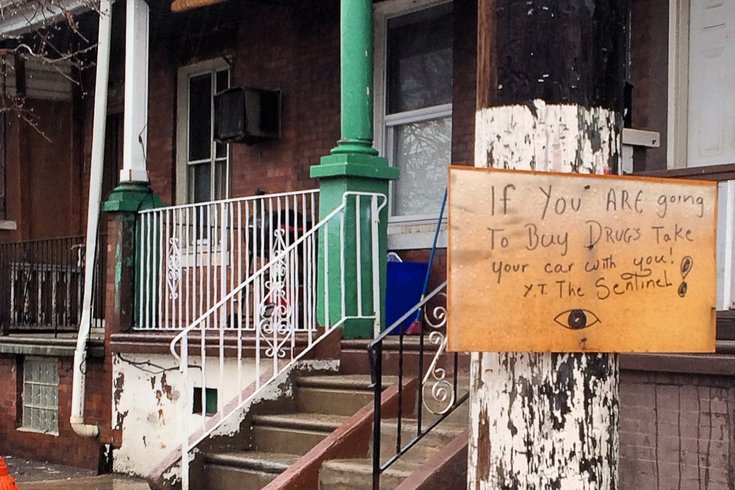
February 11, 2016
 Faces of Kensington Instagram/Via The Spirit of the Riverwards
Faces of Kensington Instagram/Via The Spirit of the Riverwards
An erstwhile Instagram page drew attention to the face of addiction on city streets, but some considered its work exploitative at best.
This is a story about an Instagram page I never saw, moderated by a pair of Philadelphians with whom I never interacted, so I apologize in advance for a lack of topical expertise.
Considering the fact that heroin addiction has become a hot-button topic in the presidential primaries, though, it bore wider mention this week.
Start by checking out Wednesday’s story by Megan Matuzak in The Spirit of the Riverwards about the erstwhile “Faces of Kensington” Instagram account. It’s really worth your time to read.
To hear Matuzak tell it, “Faces of Kensington was an Instagram account that centered around sharing images of those gripped by drug addiction at their lowest points.
“Posts to the Instagram account would depict people using drugs, neglecting their children and ‘nodding off,’ among other things. Most of the photos posted by the account were taken in Kensington,” Matuzak wrote.
The account not only drew an ever-growing “followers” base, but the scrutiny of many who found it offensively exploitative of addicts grappling with their ever-deepening rock bottom.
Faces of Kensington instagramn is a sad but true representation of what drugs do to you. Get your life out of the gutter!!!
— dale portnoy (@dportnoy27) May 5, 2015
After looking at Faces of Kensington on IG ... I just really gave up hope for a part of this city
— VII GOD #HBK (@KingRedRose) March 20, 2015
Long story short: In mid-2015, Instagram banned the account from posting and, this week, The Spirit ran a story after corresponding with its former proprietors. One of them identified himself only as “J.” Here’s what he told Matuzak:
“We aren’t banging down [addict’s] doors and watching them get high, waiting for them to do something stupid. Drive around in Kensington or any of the other ‘river towns’ and you won’t have to look at our page. The drug problem is real and it’s not hiding.”
Translation: What’s the hubbub all about? We’re just sharing something that anybody at the street level sees on a daily basis around Kensington.
J., who made a defensible point, also noted that they fielded comments from relatives of pictured addicts who hoped to track them down and bring them back from the brink. Despite the backlash – in other words – some positives came from their work.
This dichotomy immediately took me back to my days of compiling a weekly “Tuesday Night Fights” post on Deadspin.com.
It started as a way to highlight the idiocy of people who get into street fights and those who, instead of extending a peace-making hand, record them on their mobile phones while screaming – in many cases – “World Star!” It ended a little while after I realized it’d devolved into Punch Porn. No regrets, though. My point had been made.
Now, black eyes and the ravages of addiction are in no way comparable, but that same shoulder-top angel/devil dynamic exists with the Faces of Kensington fallout.
Did its curators set out to humiliate addicts? Some say so. I hope not. Yearning for attention at the expense of the weak is as immoral a pursuit as exists. But as the months went on, that’s apparently what happened even – as they accurately maintain – some good came from their efforts.
Reducing street-level storytelling content at a time of vast journalistic cutbacks is a horrible thing. The more people who see the reality of what’s going on in places they rarely see with their own eyes, the better, imho.
But we live in a world where casino commercials dedicate a few seconds to sharing the gambling-addiction hotline number and long lists of pretty debilitating side effects are read during prescription-pharmaceutical ads.
Had Faces of Kensington's expressed mission contained an element of “Hey, now that you see what heroin and other drugs are doing to people in the very city you call home, here’s what you can do to help," it would likely still not only be alive, but it would also be bringing some good to a world of bad. It might also be celebrated rather than decried.
It looks like the chance to do that is gone, though.
While Matuzak’s story is the type of neighborhood-level reportage that represents journalism in its most valuable form, what Faces of Kensington exposed – if even in an impure tangential way – is the fact that addiction is publicly real and if we, as a nation, don’t continue to try to ferret out beneficial responses, things will get worse out there on a daily basis.
Don't let that lesson get lost amid social-media controversy.